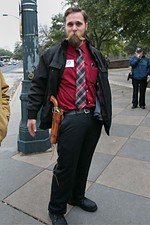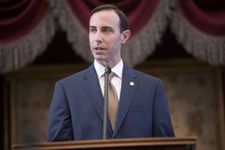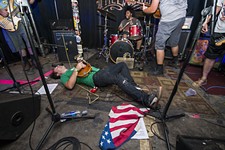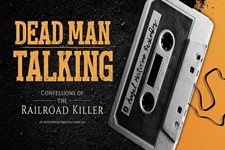Gun Carry Bills Advance
Senate Bills 11 and 17 move to full Senate
By Chase Hoffberger, Fri., Feb. 20, 2015
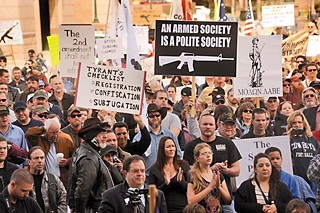
During last week's introductions for Senate Bills 11 and 17 – known colloquially as "campus carry" and "open carry" – Senate Committee on State Affairs Chair Joan Huffman, R-Houston, noted that her prior silence on each issue shouldn't reflect her opinions but rather indicate her intent to preside over the hearing. "As chairman of the committee, and my former background as a judge, I just feel it's important that I step back and allow the process to move forward," she said. "I'll be voting on the bills, too. At that point, you'll certainly know my feelings on the issues."
Indeed, it may not have been necessary to wait through the full eight hours and 45 minutes of proceedings before learning that Huffman would vote in favor of both bills. Along with each of the other nine members of the committee, the senator voted along party lines.
Thursday's progress (to the full Senate) of the two bills – SB 11, which would lift a ban on concealed handguns on university campuses, and SB 17, which would allow license holders to carry holstered handguns in public – was all but pre-determined, but it did not happen without debate. Senators Judith Zaffirini, D-Laredo, and Rodney Ellis, D-Houston – the committee's two Democrats – did what they could to sway the majority, asking for input from university chancellors, invoking Ku Klux Klan imagery, and asking specifically about the potential for racial profiling. (Sen. Craig Estes, R-Wichita Falls, the author of SB 17, did not foresee that being a problem.)
Zaffirini, Ellis, and their supporters recalled the events of Aug. 1, 1966, when Charles Whitman climbed to the top of the UT Tower and fired on the sea of students down below. Zaffirini was among those circling the tower that afternoon. She used the example as a reason to continue campus bans on guns – while bill supporters argued it was a missed opportunity for civilian policing and self-defense. They did the same with Sandy Hook, Columbine, and the 2007 shootings at Virginia Tech.
Much of the discussion Thursday focused on the logistics of these mass shootings. Yet it was Colin Goddard, a survivor of the Blacksburg massacre who took four bullets to the body, who may have laid out the cleanest perspective on the issue. "We survivors do not think it is a good idea to have guns on campus," he said during testimony, one of more than 100 people the committee heard throughout the afternoon. "There is no evidence that a bill like SB 11 would do anything to stop a mass shooting, but SB 11 would make the average day on campus more dangerous in an environment where students are dealing with failing grades, alcohol abuse, and relationship problems."
Other bases were covered: constitutional rights, the idea of familial protection, and the money it already costs gun holders to pick up a license. Senators considered the complex communities within hospitals, with students in certain places and sick children in many others, and questioned how you could regulate the combination of alcohol and firearms with a simple clause saying that you couldn't bring a gun into a bar (said Ellis: "What if you have a few spirits before heading to a church?"). At one point, a supporter of both bills testified that the heat in Texas might be a practical reason for open carry; it's tough to wear a concealing jacket during the state's hottest summer months.
Without a precise breakdown of the witnesses, it's hard to say if there were more supporters or opponents. Vocal supporters of SB 11 and 17 swarmed the Capitol in droves – many carrying (or at least trying to before having their efforts thwarted by DPS security) their handguns in cloth sleeves within their holsters. But there were just as many mothers, fathers, teachers, students, and general opponents of the bills patrolling the Capitol grounds and waiting in line to testify before Huffman and the committee.
One such opponent was Austin Police Chief Art Acevedo, who presented data indicating that 76% of 300 Texas police chiefs polled were against open carry laws. "Who pays for [police] training" as a result of this increasingly armed public? he asked the committee. Acevedo noted how dispatchers send more officers to situations where they know a gun is present, creating staffing issues and concerns about department resources, and he questioned the impact of a gun's presence during sexual assault cases occurring on campuses. So too did UT System Chancellor William McRaven, who submitted a letter expressing his concern with SB 11. His sentiments were echoed on the floor by Texas Tech Chancellor Robert Duncan and UNT Chancellor Lee Jackson, who suggested an improvement to the bill: delegating regulations to school boards of regents. (John Sharp, chancellor of the Texas A&M System, supported the bill in absentia.)
Those supporting the bills along the dais described both pieces of legislation as best serving Texans' constitutional right to bear arms, and argued ad nauseam that protecting those rights is their preeminent duty as state senators (SB 11 author Sen. Brian Birdwell, R-Granbury, stayed on script with gusto). Those who don't pledge such allegiance must evidently face the wrath of Kory Watkins, the now notorious leader of Open Carry Tarrant County, who promised to walk until his feet bleed to ensure that any opponents of the bill would lose any future elections.
Ultimately, after nearly nine hours in session, Ellis and Zaffirini stood no chance. Shortly before 6pm, both bills were approved for consideration by the full Senate, 7-2.
Got something to say on the subject? Send a letter to the editor.





